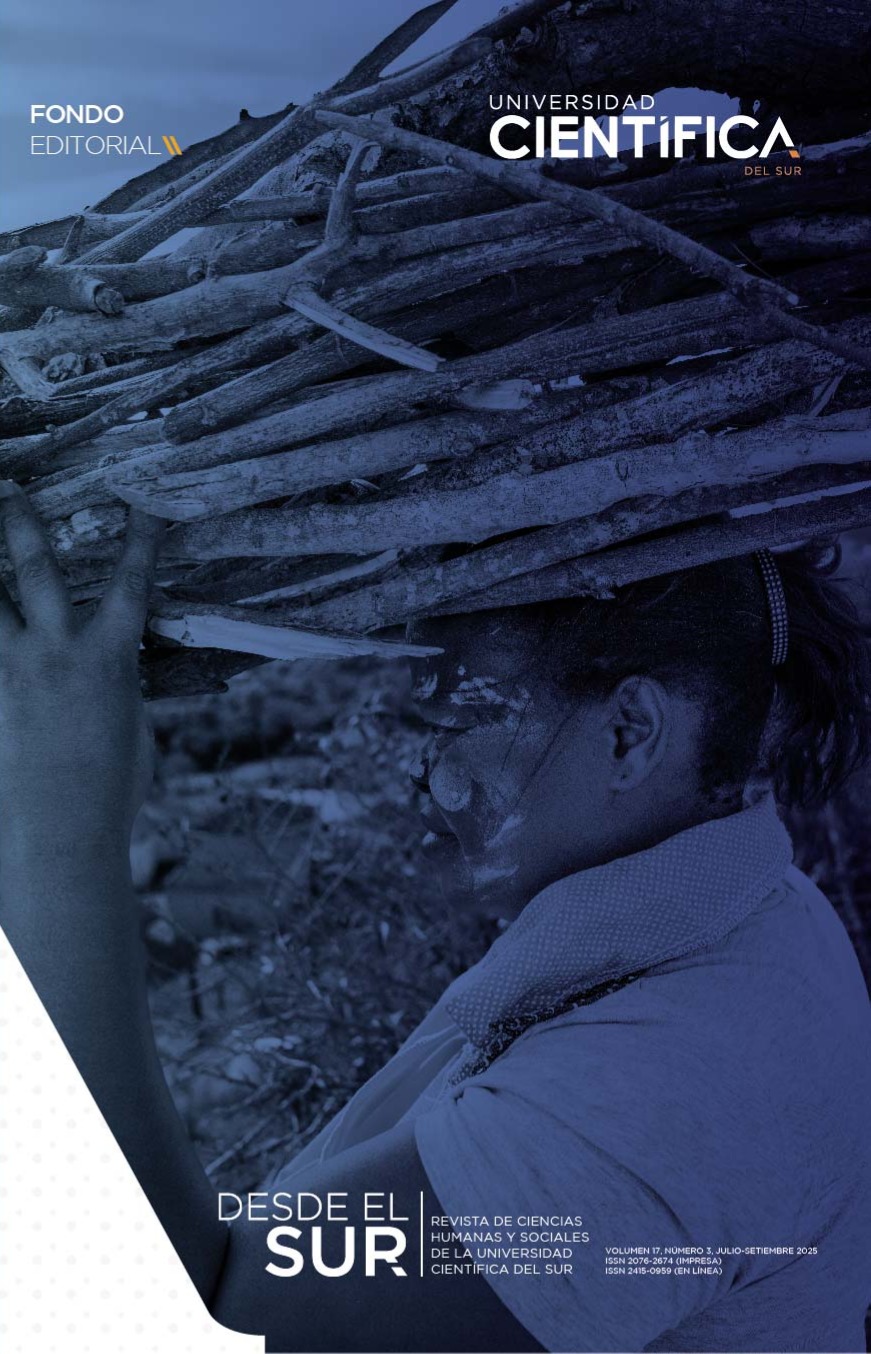Unveiling authoritarian repression of insurgency in José Ricardo Morales’ play Los culpables
DOI:
https://doi.org/10.21142/DES-1703-2025-%25pKeywords:
José Ricardo Morales, Los culpables, authoritarian practices, repressive cultural rhetorics, Chilean politicsAbstract
This article offers a critical analysis and discussion of José Ricardo Morales’ play Los culpables (1964), which may encourage critical reflection on Chile’s political reality concerning the repression of anti-authoritarian movements. The study aims to demonstrate the relevance of Morales’ play in contemporary Chile. This play serves as a case study to explore the playwright’s ideas regarding the repressive and authoritarian practices employed by a military government against citizens labeled insurgents, ultimately aiding in the examination of the Chilean context. Since this play represents various historical events linked to authoritarianism, particularly World War II and Francoism, we argue that it foreshadows the implementation of authoritarian practices by the state in Chilean society, including the state’s criminalization of protesters, insurgents, and anti-authoritarian movements in the 1960s and 1970s, as well as the criminalization of social movements during the recent 2019 Social Outbreak civil protests.
Downloads
References
Albala, A., and Tricot, V. (2019). Social movements and political representation in Chile (1990-2013). Latin American Perspectives, 47(4), 131-149. https://doi.org/10.1177/0094582x19861699
Ahumada, H., and Godoy, E. (2012). Un dramaturgo al trasluz: José Ricardo Morales. Revista Chilena de Literatura, 60, 125-137. https://revistaderechopublico.uchile.cl/index.php/RCL/article/view/1728
Alano, J., and Kong, K. (2012). Teatro chileno en Dictadura. La dramaturgia nacional como forma de resistência al Régimen Militar. VII Congreso Chileno de Sociología PreALAS.
Azcue, V. (2014). El estreno de La adaptación al medio y Cómo el poder de las noticias no da noticias del poder de José Ricardo Morales, por el Grupo Ercilla. Laberintos, 16, 215-225.
Aznar Soler, M. (2006). El dramaturgo en su laberinto. El teatro en el exilio de José Ricardo Morales. Nausicaä.
Boyle, C. (1992). Chilean Theater, 1973-1985: Marginality, Power, Selfhood. Farleigh Dickinson University Press.
Bussemer, T. (2008). Propaganda. In L. Lee Kiad and C. Holtz-Bacha, The Encyclopedia of Political Communication (pp. 659-661). Sage.
Cappelletti, A. (2018). Anarchism in Latin America (Gabriel Palmer-Fernández, trans). AK Press.
Catalá, J. (2013). Lenguaje y humor en la obra de José Ricardo Morales. Mapocho, 74, 65-85.
Charney, J., Marshall, P., and Christodoulidis, E. (2021). «It Is Not 30 Pesos, It Is 30 Years»: Reflections on the Chilean Crisis: Introduction. Social & Legal Studies, 30(4), 627-668. https://doi.org/10.1177/0964663920986432
Cortés, E., and Barrea-Marlys, M. (2003). Encyclopedia of Latin American Theater. Bloomsbury Publishing.
Daniels, H., and Downes, E. (2018). A Vygotskian argument for teaching drama in secondary schools. In S. Burgoyne (ed.), Creativity in theatre. Theory and action in theatre/drama education (vol. 2) (pp. 153-168). Springer.
Del Valle, C. (2024). Genealogy of the indigenous as an enemy: Criticism of moral, criminal, and neoliberal reason in Chile. In S. Roy (ed.), Encyclopedia of race, ethnicity, and communication (pp. 1-19). Oxford University Press.
Del Valle, J. (2021). José Ricardo Morales’ Dramatic Representation of Media Manipulation and Propaganda from a Contemporary Chilean Perspective. [Doctoral thesis, University of Groningen, the Netherlands]. https://doi.org/10.33612/diss.180927351
Del Valle, J. (2022). Propaganda and Authority in José Ricardo Morales’ play Los culpables (1964): A connection with the Chilean context. Canadian Journal of Latin American and Caribbean Studies, 47(2), 261-279. https://doi.org/10.1080/08263663.2022.2041840
Del Valle, J. (2023). Using José Ricardo Morales’ Plays to Teach Media Manipulation and Propaganda in Chilean Secondary Education. International Journal of Education & the Arts, 24(20). https://doi.org/10.26209/ijea24n20
Donoso, S., and Von Bülow, M. (2017). Social Movements in Chile: Organization, Trajectories, and Political Consequences. Palgrave Macmillan.
Garcés, M. (2019). October 2019: Social Uprising in Neoliberal Chile. Journal of Latin American Cultural Studies, 28(3), 483-491. https://doi.org/10.1080/13569325.2019.1696289
García-Manso, L. (2016). El mal de la dictadura en el teatro del exilio: responsabilidad y obediencia en Los culpables (1964), de José Ricardo Morales. In S. Hartgiw (ed.), Ser y deber ser. Dilemas morales y conflictos éticos del siglo XX vistos a través de la ficción (pp. 361-377). Iberoamericana/Vervuert.
Garretón, M. (2003). Incomplete Democracy. Political Democratization in Chile and Latin America. University of North Carolina Press.
Godoy, E. (2016). Historia e historiografía del anarquismo en Chile (1980-2015). Cuadernos de Historia (Santiago), 44, 101-137. https://doi.org/10.4067/s0719-12432016000100005
Godoy, E. (2013). Bibliografía de José Ricardo Morales. Mapocho, 74, 15-21.
Godoy, E., and Ahumada, H. (2013). José Ricardo Morales y su contexto literario y creativo. Mapocho, 74, 147-158.
Huntington, S. (1991). The Third Wave. Democratization in the Late Twentieth Century. University of Oklahoma Press.
Iglesias, M. (2017). Social Movements in Chile (1983-2013): Four Theoretical and Historical Moments. Latin American Perspectives, 44(4), 99-113. https://doi.org/10.1177/0094582X17699912
Jara, V. (1974). Manifiesto. Fundación Víctor Jara.
Kirkwood, J. (1986). Ser política en Chile: Las feministas y los partidos. FLACSO.
Larrabure, M. (2019). Chile’s Democratic Road to Authoritarianism: From Neostructuralist Bargain to State of Emergency. European Review of Latin American and Caribbean Studies, 108, 221-243. https://www.jstor.org/stable/26878970
Lemebel, P. (1996). Loco afán, crónicas de sidario. LOM.
Loxton, J. (2021). Conservative Part-Building in Latin America: Authoritarian Inheritance and Counterrrevolutionary Struggle. Oxford University Press.
Millward, P., and Takhar, S. (2019). Social Movements, Collective Action and Activism. Sociology, 53(3), NP1-NP12. https://doi.org/10.1177/0038038518817287
Morales, J. (1964). Los culpables; esbozo dramático. Anales de la Universidad de Chile, 131(4), 65-92. https://anales.uchile.cl/index.php/ANUC/article/view/22772
Ortiz, I., Burke, S., Berrada, M., and Saenz, H. (2022). World protests: A study of key protest issues in the 21st century. Palgrave Macmillan.
Palacios-Valladares, I. (2020). Chile’s 2019 October Protests and the Student Movement: Eventful Mobilization? Revista de Ciencia Política (Santiago), 40(2). https://doi.org/10.4067/s0718-090x2020005000106
Parra, V. (1961). El folklore de Chile V. III, Toda Violeta Parra. Odeón.
Piña, J. (2014). Historia del teatro en Chile. (1941-1990). Taurus.
Poblete, M., and Saavedra, J. (2015). Theatres in the intimate Chile of the 20th Century: A sociological approach from a local history. Atenea (Concepción), 512, 285-302. https://dx.doi.org/10.4067/S0718-04622015000200016
Purdy, E. (2005). Feminism. In R. Carlisle (ed.), Encyclopedia of Politics: The Left and the Right: Volume 1: The Left and Volume 2: The Right (pp. 158-161). Sage.
Ratke, A. (2017). The Politics of Memory in Post-Authoritarian Transitions: The Case of Chile. In J. Marszałek, J. Piechowiak, A. Ratke, and P. Wawrzyński (eds.), The Politics of Memory in Post-Authoritarian Transitions: Volume One – Case Studies (pp. 8-42). Cambridge Scholars Publishing.
Solimano, A., and Zapata, G. (2024). Chilean Economic Development under Neoliberalism: Structural Transformation, High Inequality, and Environmental Fragility. Cambridge University Press.
Somma, N. M., Bargsted, M., Disi Pavlic, R., and Medel, R. M. (2020). No water in the oasis: the Chilean Spring of 2019-2020. Social Movement Studies, 20(4), 495-502. https://doi.org/10.1080/14742837.2020.1727737
Teruggi, J. (2008). Feminist Movement. In L. Lee Kiad, and C. Holtz-Bacha (eds.), The Encyclopedia of Political Communication (p. 237). Sage.
Tescione, S. (2013). Civil disobedience. In D. Snow, D. Della Porta, B. Klandermans, and D. McAdam (eds.), The Wiley-Blackwell Encyclopaedia of Social and Political Movements (pp. 1-2). Wiley Blackwell.
Valdivia, P. (2014). José Ricardo Morales de mar a mar. Teatro transnacional, exilio y periferia. Renacimiento.
Voelz, J., and Freischläger, T. (2019). Toward an Aesthetics of Populism, Part II: The Aesthetics of Polarization. In W. Fluck, R. Jordan and J. Voelz (eds.), REAL – Yearbook of Research in English and American Literature: Vol. 35: The Return of the Aesthetics in American Studies (pp. 261-286). Narr Francke Attempto Verlag.
Wodak, Ruth. (2015). The Politics of Fear: What Right-Wing Populist Discourses Mean. Sage.
Downloads
Published
Issue
Section
License

Esta obra está bajo una licencia http://creativecommons.org/licenses/by-nc-sa/4.0/



















